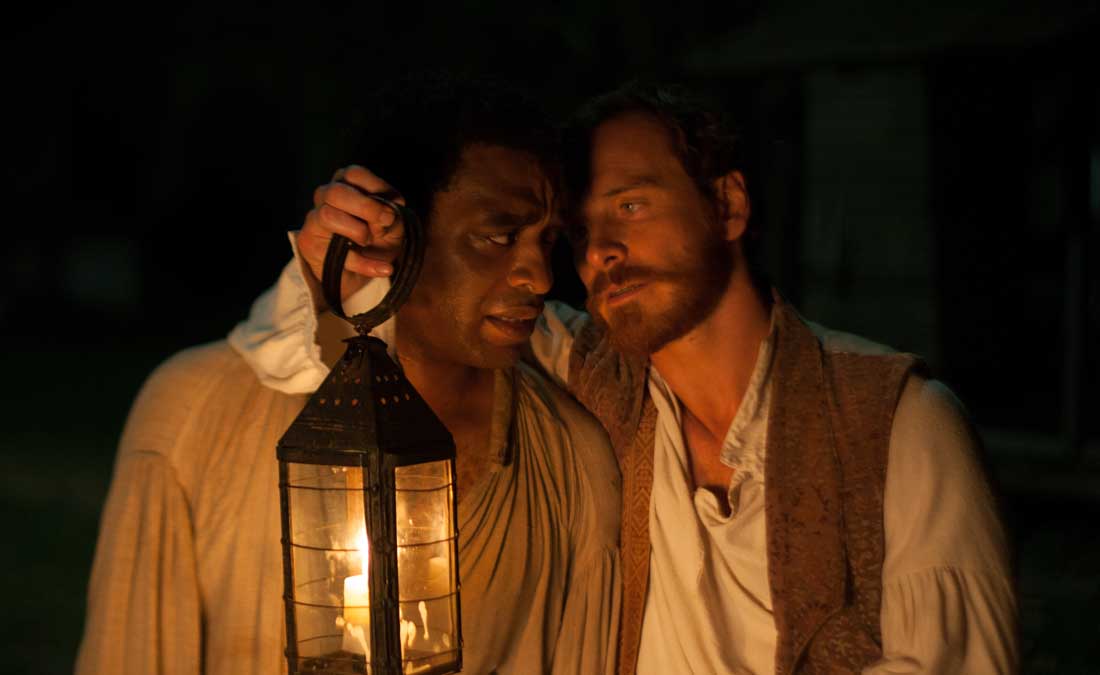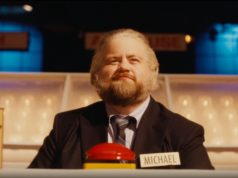I screamed at somebody after I saw 12 Years a Slave. I don’t usually do that after a movie, but this fellow critic just made me furious. “I’m a white Southerner,” she said. “I don’t need to see this.” I’ll admit my response wasn’t the most coherent. I do remember shouting the words “history” and “masterpiece” and “black perspective” and “best film of the year” at the top of my voice in that theater lobby. She just laughed at me. Yeah, I’m still angry.
What made me so mad? It’s not just that this film is a harrowing story, well told and well acted, which is reason enough to see anything. It’s that this movie touches something deep and uncomfortable in our nation’s history, something that all of us — white, black, Northern, Southern, and people like me who are none of those things — need to apprehend to truly understand our American heritage. It opens this week at AMC Parks at Arlington and next week in more theaters.
With astonishing fidelity, the film is adapted from the memoir of Solomon Northup (ghostwritten by David Wilson), who was, in 1841, a free black man in upstate New York, providing a comfortable living for his family as a violinist. His descent into hell began when two white men posing as theatrical agents lured him with the promise of a job, drugged him, and delivered him to slave dealers. Stripped of his name and severed from his former life, Northup was taken to Louisiana to work on plantations. He eventually got free and returned to his family, and his book detailing his travails outsold Frederick Douglass’ in its time.
12 Years a Slave is from the black British director Steve McQueen, and anyone who has seen his Irish prison drama Hunger or his sex addiction drama Shame will recognize his austerity and rigor. He shows us the pervasive violence required to keep slavery in place, frequently through the peripheral vision of a bewildered Solomon (Chiwetel Ejiofor) as he’s plunged into this unfamiliar world. While a slave woman (Adepero Oduye) begs not to be separated from her children, McQueen discreetly pushes her and her voice to the background to zero in on a conversation on the other side of the room between the slaver (Paul Giamatti) and a customer (Benedict Cumberbatch). Too, there’s an extraordinarily powerful long take in which Solomon is punished for insubordination by being strung up by his neck and suspended on tiptoes, left to choke on the rope while his fellow slaves go about their work, afraid to offer help.
Like the radically different Django Unchained, this movie draws a gallery of portraits of twisted human specimens created by the slave economy. This panoramic view comes from the vivid writing of African-American screenwriter John Ridley and from McQueen’s greatness at directing actors. Paul Dano is lethally playful as an overseer who makes the slaves clap to a rhythm while he sings a jolly song about a runaway slave. Garret Dillahunt comes on late as an alcoholic former overseer-turned-field laborer to relate the psychic cost of driving slaves: “A man cannot apply the lash to his fellow man day after day without shredding up himself.” Alfre Woodard exudes self-aware authority in one scene as a former slave who has married her owner and now lives a plantation mistress’ cushy life. The only misstep is Brad Pitt as a Canadian laborer who smilingly tells a slavemaster that slavery is evil — the actor is wrong not because of anything he does, but because his fame fits the role of Solomon’s eventual savior too snugly.
Most absorbing are the poisonous married couple who come to own Solomon, a sadistic master played by Michael Fassbender (a stalwart of McQueen’s films, all the more terrifying here for the flashes of love and kindness that he shows) and his wife, played by Sarah Paulson, who knows that he’s raping a slave girl named Patsey (Lupita Nyong’o) and is consumed by hatred for him, herself, Patsey, and the other slaves. The Kenyan newcomer Nyong’o delivers a hushed, terrible scene when Patsey comes to Solomon in the middle of the night and begs him to kill her. The English character actor from Inside Man, Children of Men, and Salt, Ejiofor gives the greatest performance of his career, being overtaken by grief and rage as he sings a spiritual at a fellow slave’s funeral or hardly daring to hope as he awaits his deliverance.
Calling this movie a tribute to the indomitable human spirit would only shortchange its achievement. At a time when so many politicians and voters don’t know and don’t care to know about the lives of people less fortunate than themselves, this film’s depiction of slavery reminds us of where that mindset comes from. I’m tempted to compare 12 Years a Slave to Schindler’s List, but that would be wrong, because there are far fewer films about slavery than there have been about the Holocaust. That gives even greater significance to this emotional wringer of a film.













This was a very thoughtful, even-handed review of an exquisite, not-to-be-missed film. Thank you.
Would love to know who that critic was. The “heritage not hate” crowd need to watch this film Clockwork Orange style.
Update: The movie will open at AMC Parks at Arlington this Friday, at AMC Grapevine Mills on November 1, and at Studio Movie Grill on November 8.
That Studio Movie Grill is the one in Arlington, just to clarify.
Update to the update: The movie opens wide in this area on November 1, so look for it at a theater near you.
I am glad you screamed at that other critic. She had it coming. I enjoyed your review and plan to see the film. You rock, Kristian!